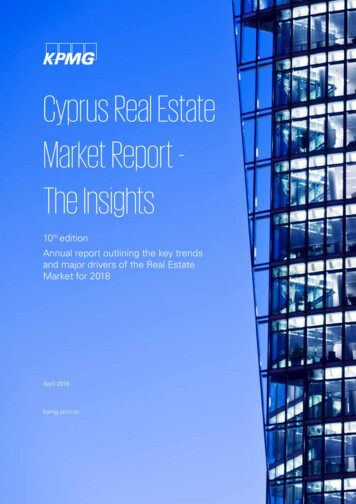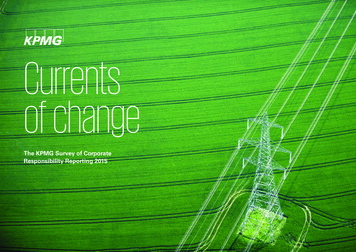
Transcription
Currentsof changeThe KPMG Survey of CorporateResponsibility Reporting 2015
Welcome to KPMG’sSurvey of CorporateResponsibility ReportingIn this ninth edition of the report, wereflect the current state of non-financialreporting worldwide, identify key trendsand provide KPMG insights.We publish this research primarily asguidance for professionals who lead thenon-financial reporting process withinlarge companies, although we recognizethat many other audiences includinginvestors, regulators, academics andNGOs also find it useful.In 2015, we have published the report inthe run-up to the 21st annual UN ClimateTalks (COP21).For this reason, we have focused ourresearch in 2015 on the quality of carbonreporting among the world’s 250 largestcompanies. We offer advice on whatKPMG member firms consider to be bestpractice in corporate carbon reportingand we explore how these companiesmeasure up against the key criteria.2We have also continued our quantitativeanalysis of CR reporting rates andapproaches around the world. This yearKPMG member firm professionalsanalyzed reporting from 4,500 companiesacross 45 countries, a research base webelieve makes this one of the mostcomprehensive and authoritative reportsavailable on the topic of non-financialreporting.We hope you find it an enlighteningread and would be delighted to hearyour thoughts. Please feel free to contactus directly if you have any commentsor questions.Adrian KingWim BartelsKPMG’s Global Headof Sustainability ServicesKPMG’s Global Headof SustainabilityReporting ian KingWim BartelsAdrian is the Global Head ofKPMG’s Sustainability Servicespractice and has more than 25years’ experience workingwith global public and privatecompanies to provide financial andnon-financial advisory, reportingand assurance services.Wim is a partner at KPMG in theNetherlands and Global Head ofSustainability Reporting andAssurance. He has been withKPMG for over 25 years and hasextensive experience in audit andforensic services, as well as deepsector knowledge in financialservices and industrial markets,such as energy, chemicals andconsumer products, acrossEurope, Asia and Africa.Adrian is an expert in non-financialreporting and especially carbonreporting, having helped manyclients prepare for the Australiancarbon pricing system (sincewithdrawn). Adrian helps clientsunderstand how environmentaland social risks and opportunitieswill affect them and representsKPMG at the COP21 climatechange meeting and the WorldBusiness Council for SustainableDevelopment.Wim delivers assurance to over40 multinational companies andregularly supports KPMG’s globalclient engagements as asustainability reporting andassurance expert. Wim has writtenextensively on sustainabilityreporting and assurance and isthe lead author of this survey.www.kpmg.com/crreporting 2015 KPMG International Cooperative (“KPMG International”). KPMG International provides no clientservices and is a Swiss entity with which the independent member firms of the KPMG network are affiliated.
ContentsAbout the survey4Executive summary5Part 1: Accounting for carbon: a report card6How should companies report on carbon?8Key findings on carbon reporting9Corporate carbon reporting needs an overhaulKPMG’s Wim Bartels provides an opinion11G250 carbon reporting: how countries compare12The G250 report card14Towards better carbon reporting:KPMG’s recommendations21Part 2: Quality of CR reporting among the G25022Quality of CR reporting improves in Asia Pacific26Better reporting of trends and risks27Part 3: Global trends in CR reporting28CR reporting becomes the norm, driven by regulation30Asia Pacific steals a lead over the West31Emerging economies step up reporting32Four sectors lag behind34CR data becomes a standard feature in annual reports36Uptake of integrated reporting is slow38Big players seek the security of independent assurance40Global Reporting Initiative could increasefocus on annual reports42Methodology44How we can help46Acknowledgments47www.kpmg.com/crreporting 2015 KPMG International Cooperative (“KPMG International”). KPMG International provides no clientservices and is a Swiss entity with which the independent member firms of the KPMG network are affiliated.
About the surveyThis survey is based on several months of research byprofessionals at KPMG member firms around the world whoanalyzed thousands of company annual financial reports,corporate responsibility (CR) reports, and websites.The study is presented in three parts:n Part 1: Accounting for carbon: a report cardn Part 2: Quality of CR reporting among the G250n Part 3: Global trends in CR reportingIn Parts 1 and 2, KPMG assessed the quality of CR reporting fromthe world’s 250 largest companies by revenue (G250) with aparticular focus on the carbon information these companiespublish in their annual financial and/or CR reports.Quality was assessed using scoring methodologies based onKPMG professionals’ view of leading reporting practices.In Part 3, the study presents global CR reporting trends based onreports issued by the top 100 companies in each of the45 countries.A more detailed methodology is on page 44.4www.kpmg.com/crreporting 2015 KPMG International Cooperative (“KPMG International”). KPMG International provides no client services and is a Swiss entity with which the independent member firms of the KPMG network are affiliated.
Executive summaryPart1Accountingfor carbon:a report cardn There is a lack of consistency in thecarbon information that the world’slargest companies publish in theirannual financial and/or CR reports. Thismakes it almost impossible to accuratelycompare one company’s carbonperformance with another’sn1 in 5 large companies in high carbonsectors such as mining and chemicalsdoes not report on carbonnC ompanies in the US and Asia Pacificcountries including China are the leastlikely to report on carbon; Europeancompanies are the most likely to do sonE uropean companies score the highestfor their carbon reportingnC ompanies in the transport & leisuresector score highest for carbonreporting among the G250, and oil & gascompanies score lowest, whenassessed using KPMG’s methodologynL ess than 1 in 10 companies that reporton carbon, report on emissions from theuse or disposal of their productspartPart2n Around half (47 percent) of the world’slargest companies do not publishtargets for carbon reduction. Europeancompanies are the most likely to do so,and companies in Asia Pacific arethe least likelyn The average timeframe for corporatecarbon reduction targets is around 11years, but few companies are aligningwith the 15 year targets being set bymany national governmentsnO nly one third (35 percent) of thecompanies that publish targets toreduce carbon explain in their reportswhy they have chosen those targetsQuality of CRreporting amongthe G250n The quality of CR reporting hasimproved slightly in Asia Pacific since2013 but has declined slightly elsewheren Companies are getting better atreporting the environmental and socialtrends and risks that affect theirbusinessespartPart23Global trends inCR reportingn Almost three quarters of N100companies now report on CR. Thecurrent rate of CR reporting among theG250 is over 90 percentnO nly half the companies that report oncarbon explain how cutting carbonbenefits their businessnM ore companies now report on CR inAsia Pacific than in any other region.n J ust over half of companies that reporton carbon include carbon data in theirannual financial or integrated reportsn Four emerging economies have thehighest CR reporting rates in the world:India, Indonesia, Malaysia and South African6 2 percent of carbon reporters invest inindependent assurance, in line withglobal rates of assurance for other CRinformation in reportingnC ompanies in the retail sector havefurthest to go, lagging behind all othersectorsn Including CR data in annualfinancial reports is now a firmlyestablished global trend. Almost3 in 5 companies do this now,compared with only 1 in 5 in 2011n The number of companies statingthat they produce integratedreports remains low: around 1 in 10n Third party independent assuranceof CR information is now firmlyestablished as standard practiceamong the world’s biggestcompanies (G250): almost twothirds invest in assurancenM ajor accountancy organizationscontinue to dominate the marketfor third party assurance amongG250 and N100 companiesn The Global Reporting Initiative(GRI) remains the most popularvoluntary reporting guidelineworldwide but use of GRI declinedamong the world’s largestcompanieswww.kpmg.com/crreporting 2015 KPMG International Cooperative (“KPMG International”). KPMG International provides no client services and is a Swiss entity with which the independent member firms of the KPMG network are affiliated.5
1Accountingfor carbon:a report cardMany of the world’s largest companies are under everincreasing pressure to cut their carbon emissions, as theglobal economy shifts slowly but steadily towards alow-carbon, and eventually zero-carbon, model.In addition, companies face ever-greater expectations andrequirements from stakeholders to provide clear,consistent and transparent information on their carbonemissions and the actions they are taking to reduce them.KPMG member firms believe that all stakeholders shouldbe able to access good quality, comparable information oncarbon performance quickly and easily from the company’sannual financial and/or corporate responsibility reports.6This enables stakeholders to understand key informationon carbon and climate in the same context as othermaterial issues disclosed by the company.KPMG has therefore analyzed carbon informationpublished by the world’s 250 largest companies (G250)in their corporate responsibility reports and their annualfinancial reports.In order to perform the analysis, KPMG researchersdeveloped a qualitative scoring methodology basedon the principles set out on page 8 of this report.Each G250 company was awarded a score out ofmaximum 100.www.kpmg.com/crreporting 2015 KPMG International Cooperative (“KPMG International”). KPMG International provides no client services and is a Swiss entity with which the independent member firms of the KPMG network are affiliated.
www.kpmg.com/crreporting7
Accounting for carbonHow should companies report on carbon?KPMG member firms believe that companies should use the following basic principles when publishingcarbon information in CR and annual financial reports1Be clear aboutmateriality and datanR eporting should clearly state whetheror not the company identifies climatechange and carbon reduction as materialissues and should explain the processthe company used to assess materialityIf the company does identify climateand carbon as material issues, then thefollowing guidelines should be followed:nC ompanies should explain whichemission scopes they considermaterial and why:- Scope 1: direct emissions from thecompany’s owned operations- Scope 2: emissions from purchasedelectricity, heat and steam- Scope 3: all other emissions producedin the course of doing business,including emissions in the supply chain(upstream) and from the use anddisposal of the company’s products andservices (downstream)82n Reporting should demonstrate that thecompany measures and monitors itscarbon emissions on an ongoing basisn Reports should give readers confidencethat the data is accurate by providingevidence of third party assurancen Where all 3 scopes are consideredmaterial, reports should cover all 3(i.e. the full carbon life cycle) or showthat the company is workingtowards doing soShow how thecompany is performingagainst carbon targets3nC ompanies should disclose clear carbonreduction targets with defined baselinesand end dates. Ideally, targets should beset for the entire group, but if that is notthe case, the report should set outtargets at business unit or country levelnR eports should explain the rationalecompanies have used to set theirtargets. For example, are they in linewith sectoral, national or international/science-based carbon reductiontargets?nR eports should clearly communicatethe company’s performance andprogress against their carbon reductiontargets including data on total emissionsat the baseline date and in the lastreporting yearnC ompanies should demonstrate theyhave a long-term commitment toreducing carbon emissions by settingtargets with a minimum goal period of5 years and preferably longerwww.kpmg.com/crreporting 2015 KPMG International Cooperative (“KPMG International”). KPMG International provides no client services and is a Swiss entity with which the independent member firms of the KPMG network are affiliated.Communicate data clearlyand explain how reductionshelp the businessn Companies should present carbon datain their annual financial or integratedreports as well as in stand-alone CR orsustainability reportsn Reports should explain how thebusiness benefits from cutting carbonemissions, for example, by reducingcosts and risk, or by creatingopportunities such as increasedinnovation, research and developmentn When the company discloses additionalcarbon information in other sources(e.g. CDP) the company’s own CR andannual report should clearly directreaders to those other sources.
Accounting for carbonKey findingsThere is a lack of consistency incarbon reporting from the world’s largestcompanies, making it almost impossible toaccurately compare one company’s carbonperformance with another.1in 5large companies in high carbon sectorssuch as chemicals, mining, industrials,metals & manufacturing and construction& materials does not report on carbon.Companies in the transport & leisuresector score most highly for the quality of their carbonreporting, and oil & gas companies score lowest.Only one thirdHighCompanies in the US, and AsiaPacific countries including China, are among thoseleast likely to report on carbon; European companiesare most likely to do so.11yearsThe average timeframe forcorporate carbon reductiontargets is around 11 years, butfew companies are aligning withthe 15 year targets now beingpublished by many internationalgovernments.13LowAround half (47 percent) of theworld’s largest companies do not publish targetsfor carbon reduction. European companies are mostlikely to do so, and companies in Asia Pacific are theleast likely.(35 percent) of thecompanies that publishtargets to reducecarbon clearly explainwhy they have chosenthose targets.Lessthan1 in10European companies scorehighest for the quality of theircarbon reporting.12Just over half ofcompanies that report oncarbon include carbon data intheir annual financial orintegrated reports.Only half the companies thatreport on carbon explain how cuttingcarbon benefits their business.62%of carbon reporters invest in independentassurance, in line with global rates ofassurance of other CR information.companies that reporton carbon, report onemissions from theuse or disposal oftheir products.www.kpmg.com/crreporting 2015 KPMG International Cooperative (“KPMG International”). KPMG International provides no client services and is a Swiss entity with which the independent member firms of the KPMG network are affiliated.9
1 THE REPORT .com/crreporting
Accounting for carbonOpinion“ Corporate carbon reporting needs an overhaul”Wim Bartels KPMG’s Global Head of Sustainability Reporting & AssuranceAt first glance, KPMG’s analysis reveals a positive picture:many of the world’s largest companies are already reportingon their carbon performance in their corporate responsibilityreports. Around half of those are also reporting on carbonreduction in their annual financial or integrated reports.Based on this evidence, it may seem that many of these largecompanies are well prepared for a low-carbon global economy andare ready to respond with clear and consistent information to theincreasing scrutiny.However, if we scratch below the surface we see this is notnecessarily the case. What actually emerges from KPMG’sanalysis is a view of fragmented, inconsistent approaches andpatchy transparency. Key information is missing from many annualfinancial and corporate responsibility reports. The information thatcompanies report and how they report it varies widely both withinand between different geographies and industry sectors. It is all butimpossible to accurately compare one company’s carbonperformance with another’s.While some companies and sectors should be congratulated for thequality of their carbon reporting, few are yet exhibiting all thehallmarks of best practice. For me, what really stands out in ouranalysis is the vast room for improvement in publishing targets forcorporate carbon reduction.The world’s largest companies must play a leading role in cuttingman-made carbon emissions because it is business that generatesthe bulk of those emissions. The pressure for companies to do so isincreasing, not least because over 150 national governments havecommitted to cut their carbon emissions as part of internationalefforts to combat climate change.“There is a clear need for improvementand global guidelines could help”Yet KPMG’s research shows that only around half the world’slargest companies currently publish targets to reduce their carbonemissions. Among those that do, only a visionary few are aligningthemselves with world governments by thinking ahead with a 15 year timeframe. And few publish sufficient information for theirprogress to be easily tracked.There is a clear need for improvement and global reporting guidelineson carbon could help to address this problem. It should not be leftto companies alone to figure this out: industry bodies, regulators,standard setters, investors and others all have a role to play.There are initiatives underway. For example, the Financial StabilityBoard has proposed a task-force to develop consistent climaterelated disclosures for companies. The Climate StandardsDisclosure Board (CDSB) has also introduced a voluntary framework.Clear global guidelines will help to address the problem ofinconsistent approaches. In the meantime, I believe the foundationof best practice is for companies to publish key carbon informationof the type we have set out in this study in their corporateresponsibility and annual financial reports.www.kpmg.com/crreporting 11 2015 KPMG International Cooperative (“KPMG International”). KPMG International provides no client services and is a Swiss entity with which the independent member firms of the KPMG network are affiliated.
Accounting for carbonG250 carbon reporting: how countries compareSix countries have 10 or more companies in the G250: China, France, Germany, Japan, UK and the US.KPMG member firms analyzed the carbon reporting data from the G250 to draw some comparisons between themRate of reporting on carbon emissionsAssurance rates for carbon dataGerman and British companies have the highestrate of reporting on carbon emissions.All French and British companies in the G250 invest in independent thirdparty assurance for their carbon data. Assurance rates are lowest in China.100% rageFranceUKGermanyJapanUSChinaBase: G250 companies that report on carbon, Source: KPMG Survey of Corporate Responsibility Reporting 2015GlobalaverageGermanyUKFranceJapanUSTimeframes of carbon targetsChinaJapanese G250 companies are the mostlikely to publish carbon reduction targetswith long term timeframes of 15 years ormore. Around one quarter (27 percent) doso – about twice the global average.Base: G250 companies. Source: KPMG Survey of Corporate Responsibility Reporting 2015Reporting on downstream emissionsJapanese companieslead the field inreporting on carbonemissions from the useand disposal of theirproducts and services.17 percent of Japanesecompanies that reporton carbon report onScope 3 downstreamemissions – more thantwice the globalaverage of 7 percent.Global average 7%14%GlobalaverageJapan 17%Germany 11%US 7%German companies scorehighest for quality of carbonreporting among the sixcountries. Chinese companiesscore the lowest.Germany27%18%17%JapanGermanyUSChina 0%UK 0%17%10%0%FranceUKChinaBase: G250 companies that report on carbonSource: KPMG Survey of Corporate Responsibility Reporting rance 6%Base: G250 companies that report on carbonSource: KPMG Survey of Corporate Responsibility Reporting 201512Quality of carbon reporting57%51%10%Base: G250 companies that report on carbonSource: KPMG Survey of Corporate Responsibility Reporting 2015www.kpmg.com/crreporting 2015 KPMG International Cooperative (“KPMG International”). KPMG International provides no client services and is a Swiss entity with which the independent member firms of the KPMG network are affiliated.
Reporting on benefits of cutting carbonGlobal average 51%Germany 94%UK 83%France 71%Japan 61%US 43%China 23%In the US, less than half the G250 companies that reporton carbon explain how reducing carbon emissionsbenefits the business.Base: G250 companies that report on carbonSource: KPMG Survey of Corporate Responsibility Reporting 2015Publishing of carbon targets53%Global aChinese companies are the least likely to publish targetsto reduce their carbon emissions. Only one of the 39G250 companies in China publishes any targets.Base: All G250 companiesSource: KPMG Survey of Corporate Responsibility Reporting om/crreporting 13 10 2015 KPMG International Cooperative (“KPMG International”). KPMG International provides no client services and is a Swiss entity with which the independent member firms of the KPMG network are affiliated.
Accounting for carbonThe report cardWhich companies report on carbon?4 Achievements Room for improvement4 out of 5 G250 companies identifyclimate change and carbon as materialissues and report on their carbonemissions. This appears, on the surface,to be a relatively high rate.It is surprising that in sectors known forhigh emissions, some major companiesdo not identify carbon and climatechange as material issues and do notreport on their carbon impact.Rate of carbon reporting by sectorFor example, around 1 in 5 companiesdoes not report on carbon in the mining;chemicals; industrials, manufacturing &metals; and construction & %75%73%67%Food & beverageUtilitiesOil & gasTechnology, media & telecomsRetailHealthcareChemicalsConstruction & materialsMiningAutomotiveFinancial servicesTransport & leisureIndustrials, manufacturing & metalsBy contrast, all G250 companies in thefood & beverage sector do report.Most (around 85 percent) of thecompanies that do not report on carbonare based in the US or Asia Pacificnations including China.Rate of carbonreporting by regionKPMG viewCompanies in thepersonal & householdgoods sector are theleast likely to report oncarbon. Yet they havesignificant opportunitiesto reduce emissionsthrough the value chain,by working withsuppliers, reducingemissions in theproduction process anddesigning products witha lower climate changeimpact in use anddisposal.However, financialservices firms shouldalso consider the carbonimpact of the businessesthey fund or invest in,and the carbon-relatedrisks in their loan andinvestment portfolios.The fact that financialservices companies havea low rate of reporting oncarbon suggests thatthey are looking onlyat the direct carbonemissions of their ownoperations which aresmall when comparedwith other industriessuch as oil & gas.Government action maybe needed to stimulatecarbon reporting in thesecountries.80%74%It is interesting to seethat US and Chinesecompanies, based inthe highest emittingcountries in the world,are amongst the leastlikely to report.Personal & household goodsBase: 250 G250 companiesSource: KPMG Survey of CorporateResponsibility Reporting 20151493%www.kpmg.com/crreporting 2015 KPMG International Cooperative (“KPMG International”). KPMG International provides no client services and is a Swiss entity with which the independent member firms of the KPMG network are affiliated.EuropeAmericasAsiaPacificBase: 250 G250 companiesSource: KPMG Survey of CorporateResponsibility Reporting 2015
Accounting for carbonThe report cardWhat is the quality of carbon reporting?4 Achievements Room for improvementEuropean companies score highest forthe quality of their carbon reporting.Their reporting scores an average of62 out of a possible 100.European companies have higher scoresfor reporting more data on carbonemissions than companies in otherregions. They also report moreinformation on their progress againstcarbon reduction targets.KPMG viewCompanies in the Americas and AsiaPacific lag behind Europe with averagescores of 49 and 40 respectively.It is to be expected thatEuropean companies willlead in the quality of carbonreporting as they are mostexperienced, althoughreporting in this region couldbe further improved. The EUEmissions Trading System waslaunched in 2005 and requiresheavy emitters of carbon tomeasure, monitor and managetheir carbon emissions.Companies in China have significantlylow scores, at an average of 10 outof 100.Oil & gas companies have the lowestsectoral quality of carbon reporting withan average score of 35 out of 100.Australian companies lead in Asia Pacificfor carbon reporting quality, with anaverage score of 65. Companies in SouthKorea and Japan also have relatively highscores at 60 and 58 respectively.68Transport& leisureIt is likely that the quality ofcarbon reporting will increaserapidly in Asia Pacific as carbonpricing and trading is introduced.South Korea brought in acarbon trading system in 2015and China will do so in 2017.Many companies in highcarbon sectors do not reporttargets for carbon reduction orreport on their performanceagainst targets.Companies in the industrials,manufacturing & metals;construction & materials;and oil & gas sectors haveparticularly low scores fortarget setting andperformance.Quality of carbon reporting by sector (scores out of 100)63Chemicals61Automotive61Technologymedia &telecoms60Personal tail49Food cturing& metalsConstruction& materials35Oil & gasBase: 205 G250 companies, Source: KPMG Survey of Corporate Responsibility Reporting 2015www.kpmg.com/crreporting 15 2015 KPMG International Cooperative (“KPMG International”). KPMG International provides no client services and is a Swiss entity with which the independent member firms of the KPMG network are affiliated.
Accounting for carbonThe report cardWhat emissions do companies report on?4 Achievements Room for improvement3/4Far fewer companies report on theemissions in their value chains (Scope3). Half report on emissions in theirsupply chain (Scope 3 upstream) butless than one in ten (7 percent) reportson the carbon impact of using ordisposing of their products andservices (Scope 3 downstream).More than 75 percent of companies thatreport on carbon report on their directemissions (Scope 1) and emissions frompurchased electricity, heat and steam(Scope 2).KPMG viewAnalyzing the full carbonlifecycle of products andservices can be acomplex and timeconsuming process. Itcan be especiallychallenging for retailersthat sell thousands ofdifferent products. So itis not surprising that sofew companies arecurrently reporting ondownstream emissions.However, assessing thefull carbon impact of acompany is becomingmore achievable ascarbon analysis tools,methodologies and datasources improve.Emission scopes reported84%Scope 179%Scope 250%Scope 3 upstreamScope 3 downstream7%Base: 205 G250 companies that report on carbonSource: KPMG Survey of Corporate Responsibility Reporting 201516www.kpmg.com/crreporting 2015 KPMG International Cooperative (“KPMG International”). KPMG International provides no client services and is a Swiss entity with which the independent member firms of the KPMG network are affiliated.
Accounting for carbonThe report cardHow many companies publish targets?4 AchievementsRate of target publishing by sector Room for improvementAround half of the world’s largestcompanies (53 percent) publish targetsto reduce their carbon emissions.Close to half of the world’s largestcompanies (47 percent) publish notargets to reduce their carbon emissions.Companies in Europe are the most likelyto publish targets to reduce their carbonemissions.Companies in Asia Pacific, are the leastlikely to do so, with only 33 percent ofcompanies in this region publishing targets,compared with 55 percent of companies inthe Americas and 72 percent of companiesin Europe.Worldwide, companies in the transport& leisure, utilities, technology, media &telecoms, and food & beverage sectorsare the most likely to publish targets forreducing carbon.Companies in the oil & gas; construction& materials and industrials, metals &mining sectors are the least likely topublish targets for carbon reduction.The challenge for thesecompanies is that theirtraditional business models areinextricably linked to emittingcarbon. Publishling targets to75%Utilities75%73%Technology, media & telecoms70%Food & beverage67%Personal & household goodsKPMG viewIt is notable that some of theheaviest emitters of carbon,such as the oil and gas sector,are the least likely to publishtargets to reduce theircarbon emissions.Transport & leisurereduce carbon can therefore beconstrued as setting targets tolimit the growth of the business.provision of low-carbon energyand away from high-carbonfossil fuels.That said, there are signs thatstrategic shifts are starting totake place even within theseindustries. For example, severalEuropean oil majors have openlycalled for global carbon pricingand some are steering theircompanies towards theThis
annual financial and/or corporate responsibility reports. This enables stakeholders to understand key infor
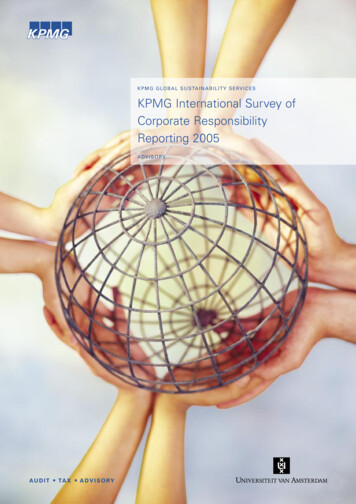
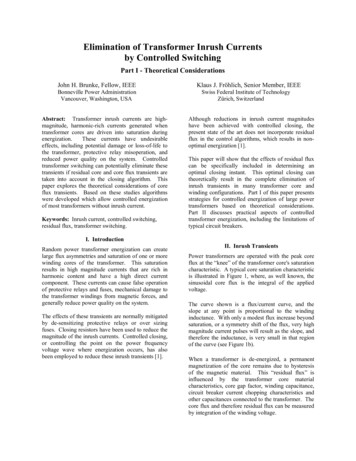
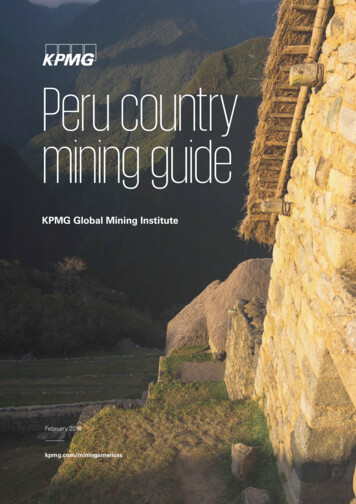
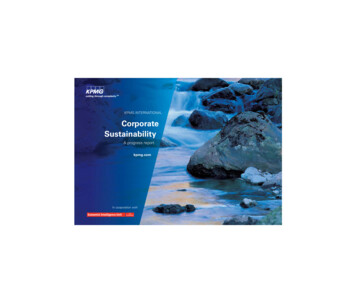
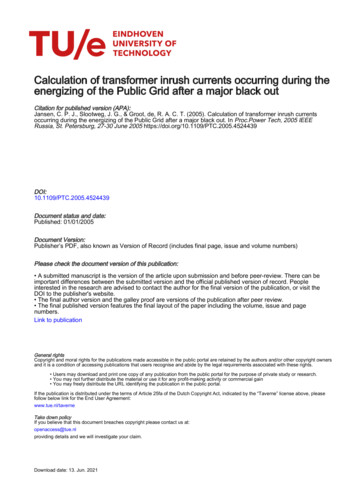
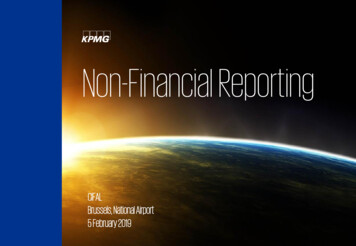
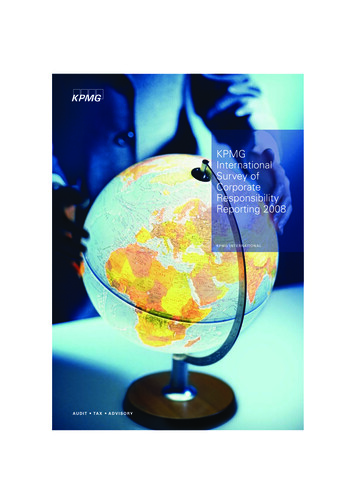
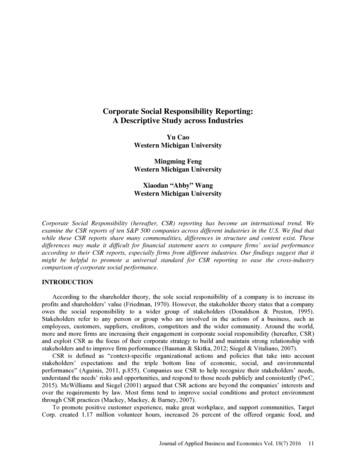
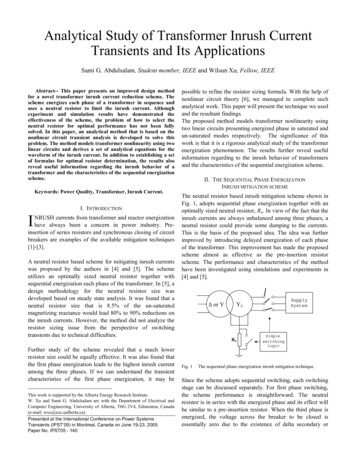
![[] 9 IA NCLUDING R THE R OF F](/img/1/modern-auditing-chapter09.jpg)
